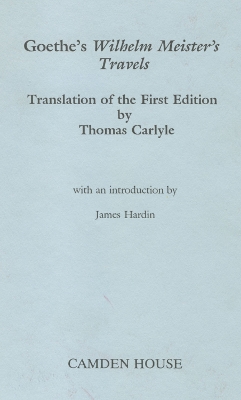Studies in German Literature, Linguistics, and Culture
1 total work
Goethe's Wilhelm Meisters Lehrjahre was the most influential German novel ever written. However, its so-called sequel, Wilhelm Meisters Wanderjahre oder die Entsagenden (Wilhelm Meister's Travels) has never been a popular work and has received much less critical attention than the Lehrjahre. A Recent upsurge of interest among literary critics in Goethe's late novel has much to do with the fact that some "idiosyncrasies" of the book -its unconventional structure, its mixture of genres, its irony, its disdain for verisimilitude, its philosophical-analytical passages - mark it precisely as a fore-runner of the modern novel, or, better put, show undeniable affinities with the structure and modes of modern literature and thus mark it as a work particularly worthy of our interest. Professor James Hardin (South Carolina) provides a new introduction to the work that analyzes its relationship to its more famous predecessor, and the role of Goethe's works in Carlyle's creative career.
